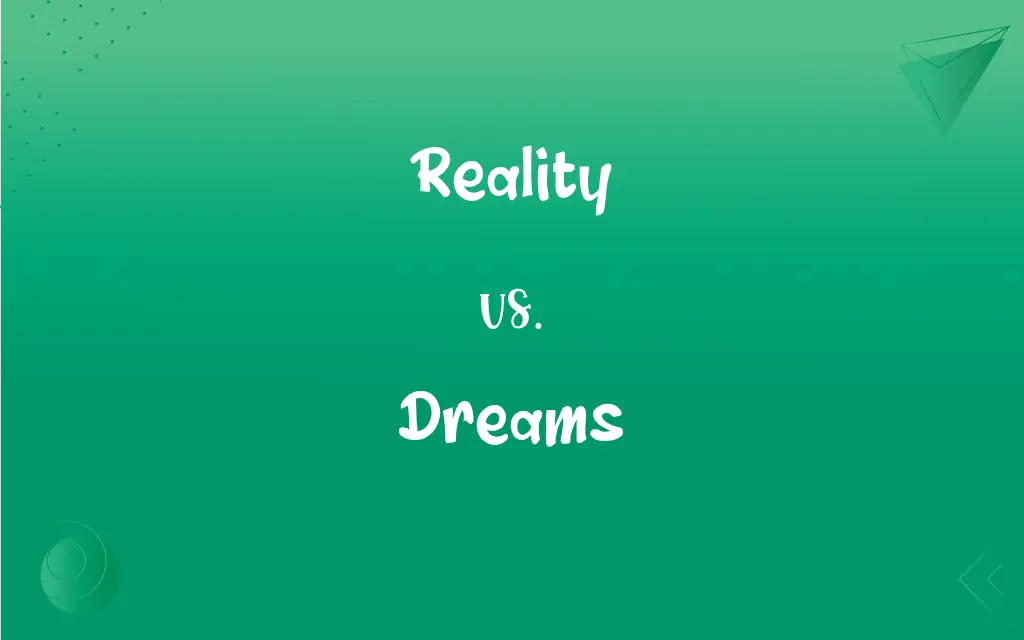Reality vs. Dreams: What's the Difference?
Edited by Janet White || By Harlon Moss || Published on January 30, 2024
Reality is the state of things as they actually exist, experienced through senses. Dreams are mental experiences during sleep, often symbolic and not based in reality.

Key Differences
Reality is the actual state of the world experienced through our senses and validated by shared understanding, whereas dreams are sequences of images, emotions, and thoughts occurring in the mind during sleep, often without logical coherence or grounding in reality.
Reality is bound by physical laws and consistent logic, offering a tangible and measurable world, while dreams are free from these constraints, allowing for imaginative and often impossible scenarios.
In reality, events and experiences are constrained by time and space, following a linear progression, but dreams can defy these limitations, presenting nonlinear and disjointed narratives that may seem surreal when compared to real-world logic.
Reality is influenced and shaped by external factors such as society, environment, and physical laws, whereas dreams are internal constructs of the mind, influenced primarily by an individual's subconscious thoughts, feelings, and desires.
The perception of reality is often shared and agreed upon collectively, forming the basis for objective knowledge and understanding, whereas dreams are highly personal and subjective, differing greatly from one person to another.
ADVERTISEMENT
Comparison Chart
Basis
Actual state of the world, experienced sensibly
Mental experiences during sleep, often symbolic
Constraints
Bound by physical laws and logic
Free from physical and logical constraints
Progression
Linear and time-bound
Nonlinear, often surreal and disjointed
Influence
External factors like society and environment
Internal, driven by subconscious thoughts
Perception
Collective and shared understanding
Personal and subjective experiences
ADVERTISEMENT
Reality and Dreams Definitions
Reality
Reality is often validated by shared, objective understanding.
The reality of climate change is recognized by most scientists.
Dreams
Dreams are a series of thoughts and images occurring during sleep.
Last night, I had a dream about flying over mountains.
Reality
Reality is bound by the laws of nature and physics.
In reality, gravity ensures that what goes up must come down.
Dreams
Dreams can be surreal, defying the laws of reality.
In my dream, I conversed with a talking cat.
Reality
Reality is the state of things as they actually exist.
The harsh reality of the situation was difficult to accept.
Dreams
Dreams can sometimes influence creative and problem-solving processes.
He found the solution to the problem in his dreams.
Reality
It encompasses the actual events and conditions of the world.
The reality of life in a big city can be both exciting and challenging.
Dreams
They often represent subconscious desires or fears.
My dreams often reflect my anxieties about work.
Reality
It's experienced through sensory perception and factual evidence.
In reality, the sun rises in the east and sets in the west.
Dreams
They are personal and vary greatly from person to person.
She dreams of traveling the world, a reflection of her adventurous spirit.
Reality
The quality or state of being actual or true.
Dreams
A series of images, ideas, emotions, and sensations occurring involuntarily in the mind during certain stages of sleep.
Reality
One, such as a person, an entity, or an event, that is actual
"the weight of history and political realities" (Benno C. Schmidt, Jr.).
Dreams
A daydream; a reverie.
FAQs
What is reality?
The state of things as they actually exist, experienced sensibly.
How does reality differ from dreams in terms of logic?
Reality follows logical laws, while dreams often lack logical coherence.
Can dreams affect our perception of reality?
Yes, they can sometimes influence our thoughts and emotions in reality.
Is reality the same for everyone?
Generally, yes, but individual perceptions can vary.
What are dreams?
Mental experiences and imagery occurring during sleep.
Is reality always tangible and measurable?
Typically, yes, as it's based on concrete evidence and sensory experience.
Do dreams have a purpose?
They can aid in processing emotions and problem-solving.
How do people perceive reality differently?
Through individual experiences, beliefs, and cultural backgrounds.
Can we control our dreams?
Some people can, through techniques like lucid dreaming.
Do animals dream?
Yes, many animals show signs of dreaming during sleep.
Can dreams inspire creative work?
Absolutely, many artists and inventors have been inspired by dreams.
Are dreams a reflection of real-life experiences?
Often, they are influenced by one's subconscious thoughts related to real life.
Can dreams predict the future?
There's no scientific evidence to support that dreams can predict future events.
What role does culture play in interpreting dreams?
Cultural beliefs can significantly influence how dreams are interpreted.
What is the role of the subconscious in dreams?
It plays a major role, often driving the content and emotion in dreams.
Are dreams always related to personal experiences?
They often are, but they can also be completely fantastical or surreal.
How do shared experiences shape reality?
They create a collective understanding and agreement about the world.
Is reality subjective or objective?
It's primarily objective, but personal perceptions can add subjective elements.
Is our understanding of reality ever complete?
No, it's continually evolving with new experiences and knowledge.
Can dreams be manipulated or directed?
In lucid dreaming, individuals can exert some control over their dreams.
About Author
Written by
Harlon MossHarlon is a seasoned quality moderator and accomplished content writer for Difference Wiki. An alumnus of the prestigious University of California, he earned his degree in Computer Science. Leveraging his academic background, Harlon brings a meticulous and informed perspective to his work, ensuring content accuracy and excellence.
Edited by
Janet WhiteJanet White has been an esteemed writer and blogger for Difference Wiki. Holding a Master's degree in Science and Medical Journalism from the prestigious Boston University, she has consistently demonstrated her expertise and passion for her field. When she's not immersed in her work, Janet relishes her time exercising, delving into a good book, and cherishing moments with friends and family.































































